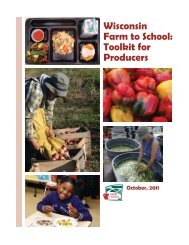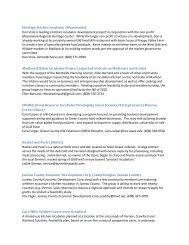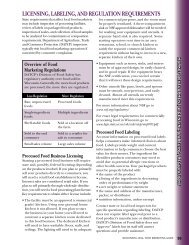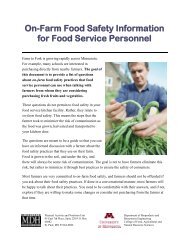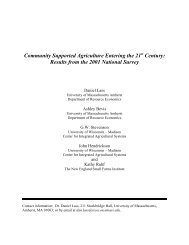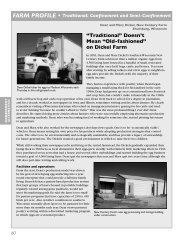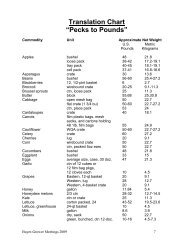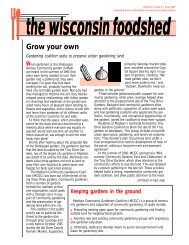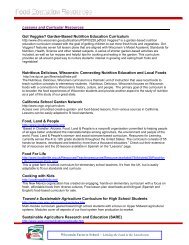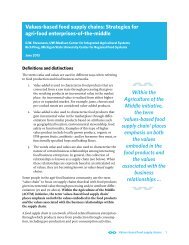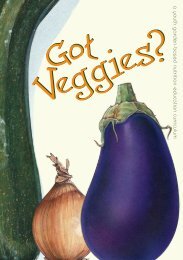Poultry Your Way - Center for Integrated Agricultural Systems ...
Poultry Your Way - Center for Integrated Agricultural Systems ...
Poultry Your Way - Center for Integrated Agricultural Systems ...
Create successful ePaper yourself
Turn your PDF publications into a flip-book with our unique Google optimized e-Paper software.
PROCESSING<br />
ALTERNATIVES<br />
32<br />
<strong>Poultry</strong> <strong>Your</strong> <strong>Way</strong><br />
PROCESSING ALTERNATIVES<br />
Mobile Processing. The Mobile Processing Unit (MPU) is a relatively new on-farm processing alternative. MPUs<br />
are processing plants on wheels; they are custom-built, cooperatively owned and staffed, mobile facilities that<br />
travel from farm to farm at butchering time. For farmers who do not have access to a custom processor or who<br />
can’t justify their own on-farm facility, an MPU may be the answer. “An MPU is a way to start small and spread<br />
the equipment cost among a group of producers,” note the authors of Growing <strong>Your</strong> Range <strong>Poultry</strong> Business:<br />
An Entrepreneur’s Toolbox. “It offers a chance to develop the product, test market, and iron out production<br />
problems. The group can later establish a small, permanent plant” (Fanatico and Redhage, 2002).<br />
Several MPUs have been built across the country. Some of the first were constructed in Kentucky, Nebraska, South<br />
Dakota, and New York. Most recently, 12 farmers in Michigan experimented with the MPU idea, thanks to funding<br />
from the USDA Sustainable Agriculture Research and Education program. In 1999-2000 they worked with Wagbo<br />
Peace <strong>Center</strong> (WPC) and Michigan Department of Agriculture staff to design and build a federally licensed, mobile<br />
processing plant. “We determined that it was not reasonable <strong>for</strong> every farmer to build a processing facility at their<br />
farm, and that a much more practical way to approach processing would be to have a portable unit that could<br />
be licensed and serve all the small farms in our area,” says project leader and WPC Manager Rick Meisterheim<br />
(Lehnert, 2002).<br />
The Michigan MPU took approximately 360 hours of labor to complete. The project team retrofitted a used trailer<br />
by building an interior wall to divide the scald and pluck area from the eviscerating area. They hired contractors<br />
to do the electrical, gas, and plumbing hook-ups. Fanatico estimates that a 400-bird-per-day MPU can be built <strong>for</strong><br />
$7,000 to $12,000 (Fanatico, 2003a). The Michigan MPU, outfitted with new equipment, cost about $18,000.<br />
In addition to financing, you’ll need good organization, plus leadership and management skills in order to<br />
successfully process using a MPU. Farmers in Wisconsin, <strong>for</strong> instance, built an MPU but never really got it off the<br />
ground, says <strong>Center</strong> <strong>for</strong> <strong>Integrated</strong> <strong>Agricultural</strong> <strong>Systems</strong>’ Steve Stevenson, because no one was responsible <strong>for</strong> the<br />
management and maintenance of the processing facility.<br />
The Michigan unit has been successful because WPC coordinates all scheduling and manages fee collection. WPC<br />
and members per<strong>for</strong>m maintenance, and new growers must train with a current member be<strong>for</strong>e using equipment.<br />
Members also trade work on processing days, helping one another. Michigan farm members “have gone above<br />
and beyond” to help out with maintenance according to WPC Program Coordinator Jennifer Lewis. “It’s a very<br />
cooperative ef<strong>for</strong>t” (Jennifer Lewis, Wagbo Peace <strong>Center</strong> Program Coordinator, personal communication, 2004).<br />
Four years after processing their first bird, the Michigan growers now handle up to 250 chickens, turkeys, and<br />
ducks on butchering days. Rumor has it, one grower will be trying geese soon.<br />
Off-Farm Processing. The majority of processors who offer services to farmers on a custom basis will<br />
slaughter, cut-up, bag or package, and label products. There are few custom processors and even fewer certified<br />
organic processors. If you are lucky enough to live near a custom processor, you’ll still need to check into its<br />
reputation <strong>for</strong> quality, and consider your transportation, time, and expenses (also see Figure 18).<br />
Many off-farm plants use automated equipment and consequently may not be able to process in small batches,<br />
or may have equipment sized <strong>for</strong> only one species or one type of bird (such as broilers). Call processors in your<br />
area to learn more about their services—what type of birds they process, if they will work with your own recipes,<br />
what type of inspection or certification status they hold, etc.



